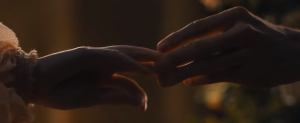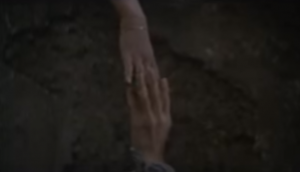Romeo and Juliet, Act 2 Scene 2 is the most memorable and pivotal scene in the play and I have chosen to compare the way in which the three most popularized films, Zeffirelli (1968), Luhrmann (1996), and Carlei (2013) have interpreted this moment. This scene involves Romeo risking his life to catch a glance at Juliet when to his luck she appears on her balcony. Despite their families being mortal enemies they confess their mutual love for each other and agree to be married.
Zeffirelli and Carlei take very similar approaches and stay close to the traditional imagery of this scene with Romeo sneaking up to Juliet’s window and immediately seeing her on the balcony. Both directors also chose to play a soft tranquil sound track setting the tone of the scene. However, Zeffirelli provided a more believable encounter having Romeo appear from the cover of the trees to over hear Juliet. Her dialogue mirrors the emotion and tone in her voice and she moves from deep though to infatuation over the thought of Romeo. Carlei on the other hand fails to produce a convincing scene as Romeo walks through a courtyard seemingly in plain view of Juliet only to overhear a disappointingly flat and emotionless performance. Her dialogue is cut rather short but in this case that is probably for the best as there was nothing the gain from listening to her monotone rendition.
Luhrmann takes a very different approach to developing this scene and is by far my favorite of the three. Romeo makes a comical entrance crashing through patio furniture only to gaze into the eyes of the wrong woman while Juliet makes her appearance not on a balcony but on the same patio that Romeo is on. Although the proximity of the two can be measured with a few feet I can accept that Romeo is concealed and find this to enhance the comical aspect, concluding with them falling into the pool. Juliet’s final line before being startled illustrates how each film has adapted this scene: “Romeo, doff thy name, And for that name which is no part of thee Take all myself.”
Carlei’s disappointing delivery.
Zeffirelli’s convincing delivery
https://youtu.be/7_pfzu-brPM?t=47m52s
Luhrmann’s comical delivery
Zeffirelli and Carlei continue to provide a similar style to the scene having Romeo climb up to the balcony to see Juliet. One having him climb a wall of vines and the other having him climb up a near by tree. In Carlei’s version the modern production gives the scene rich props and backgrounds to please the eye but the acting is very boring and low key. I don’t get the sense that these two people are passionately in love but rather simply two actors reading lines. The only thing that elects any emotion in this scene is the accompanying music that gives a sense of joy and triumph.
Zeffirelli successfully draws the viewer in by having the actors confess their love with only the backdrop of ambient sounds at first, relying completely on the integrity of the acting. These characters are believable because their expressions match their words. If you were to watch both version with mute you would still receive the entire message from Zeffirelli. Once they declare to be married Juliet leaves for a moment allowing Romeo to express his boundless joy by bouncing around on the tree he climbed. Both productions end the scene with the two lovers hands slowly sliding apart as they leave, perhaps Carlei is giving a nod to the previous production.


Luhrmann remains consistent in giving us a completely different interpretation of the scene, having the remainder take place in the water. This choice forces the actors to express themselves with only their heads and hands as the rest of their bodies are submerged under the water. Even with the limitation this version delivers the clearest message in my opinion. Juliet shows hesitation and reservation as Romeo goes in to kiss her at first which adds the allure of Romeo having to chase his love. For much of the scene Juliet is slowly moving away from Romeo forcing him to chase her around the pool, like she is playing “hard to get”. After they declare they will be married Luhrmann continues playing with the comical aspect he has already established by having them fall in to the pool once again. The scene ends with Juliet running up to her balcony but instead of their hands slipping away from each other she drops him a trinket.
Although Zeffirelli and Carlei took very similar approaches to creating this scene I feel Zeffirelli was the one who did it right. Even though the production is over 40 years older he was able to deliver a more genuine scene mainly by having good actors. Luhrmann has a more modern take on the scene and has fun with it, breaking away from the expected and allowing the viewer to relate to the characters and because of that I would award this version as the most successful one.
References:
Luhrmann
www.youtube.com/watch?v=7_pfzu-brPM
Zeffirelli
www.youtube.com/watch?v=bTbetu76tS4&list=PLsl2fxRmk3kTQNMk-6_OrOKBJbWsWJwyR&index=7
Carlei
www.youtube.com/watch?v=kK11GlFhUSc
Leave a Reply
You must be logged in to post a comment.